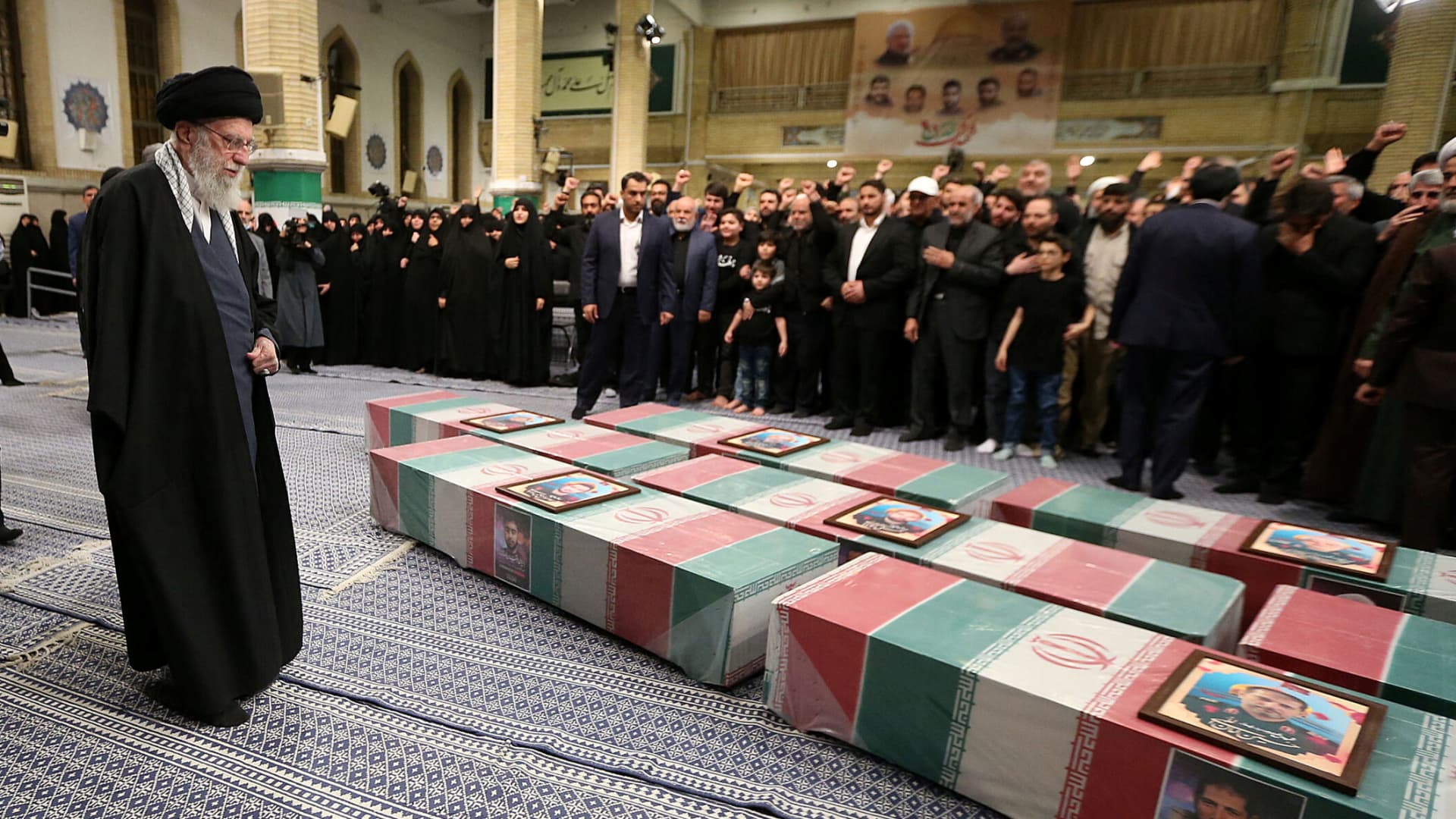Iran’s Supreme Leader, Ayatollah Ali Khamenei looks at the coffins of members of the Islamic Revolutionary Guard Corps who were killed in the Israeli airstrike on the Iranian embassy complex in the Syrian capital Damascus, during a funeral ceremony in Tehran, Iran April 4, 2024. Office of the Iranian Supreme
WANA News Agency | Via Reuters
Iran on Saturday launched attacks against Israel, according to U.S. officials, escalating long-standing tensions between the two nations that have the potential to trigger a regional war.
“Iran has begun an airborne attack against Israel,” National Security Council spokesperson Adrienne Watson said in a Saturday statement. “The United States will stand with the people of Israel and support their defense against these threats from Iran.”
Israel Defense Forces spokesperson Daniel Hagari said Saturday that Israel would work “in close coordination” with the U.S. and regional partners to intercept the launches.
“We are monitoring the threat in the airspace. It is a threat that takes several hours to reach the territory of the State of Israel,” he added.
Israeli Prime Minister Benjamin Netanyahu convened his war cabinet in Tel Aviv, following the announcement of the missile and drone launches, according to the Prime Minister’s Office.
International leaders including European Council President Charles Michel, U.K. Prime Minister Rishi Sunak and France’s foreign ministry publicly condemned Iran’s attack on Saturday.
The Biden administration is expecting Iran to target Israeli government sites, not civilian or religious sites and not U.S. assets in the area, U.S. officials told NBC News.
The administration is anticipating the attack to involve 100 drones, dozens of cruise missiles and dozens of ballistic missiles, one of the officials added.
Ahead of the attacks on Saturday, President Joe Biden was en route back to the White House, earlier than initially scheduled, to meet with his national security team, including Defense Secretary Lloyd Austin and Secretary of State Antony Blinken, amid the growing prospect of an Iranian strike.
Earlier on Saturday, Iran’s Revolutionary Guard seized a Portuguese-flagged cargo ship with links to Israel in the Strait of Hormuz, a key shipping route. The White House condemned the move shortly after.
In anticipation of the attacks, airspaces in Israel and throughout the region were being temporarily shut down.
Israel also announced that beginning on Sunday, it would close schools and limit gatherings to 1,000 people in certain areas.
Strains between Iran and Israel have been heating up since the start of the war in Gaza in October, and especially over the past several weeks after Iran accused Israel of perpetrating an attack on its consulate in Damascus on April 1.
The Islamic Revolutionary Guard Corps said in a Saturday statement that the missile and drone launches were “in response to the crimes by the Zionist Regime.”
Iranian leaders, including Ayatollah Ali Khamenei, had previously pledged to retaliate against Israel for the Damascus strike and Israel, in turn, threatened a counterattack of its own. Israel has neither confirmed nor denied its involvement in the Damascus attack.
“If Iran attacks from its territory, Israel will react and attack in Iran,” Israeli Foreign Affairs Minister Israel Katz wrote in a Wednesday post on X, tagging the Ayatollah’s X account.
Given Iran’s various warnings, the White House had been expecting an Iranian strike and had been communicating with Israel to ensure they would be prepared to defend themselves.
In a statement after the launches, Iran’s mission to the United Nations warned the U.S. not to get involved.
“It is a conflict between Iran and the rogue Israeli regime, from which the U.S. MUST STAY AWAY!” the mission posted to X.

